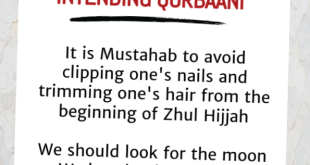 1. If you are leaving behind your dependants e.g. wife and children etc. then ensure that sufficient arrangements are made for their needs and requirements before leaving. [1]
1. If you are leaving behind your dependants e.g. wife and children etc. then ensure that sufficient arrangements are made for their needs and requirements before leaving. [1]
2. While on journey, ensure that you remain in pious company. Remaining in pious company will motivate one towards righteousness.
عن علقمة قال قدمت الشأم فصليت ركعتين ثم قلت اللهم يسر لي جليسا صالحا فأتيت قوما فجلست إليهم فإذا شيخ قد جاء حتى جلس إلى جنبي قلت من هذا قالوا أبو الدرداء فقلت إني دعوت الله أن ييسر لي جليسا صالحا فيسرك لي (البخاري رقم 3287)
Hadhrat Alqamah (Rahmatullahi Alaihi) says: “I proceeded to Syria (on a journey) and I performed two rakaat salaah. I then made Duaa “O Allah, allow me to sit in the company of a pious person.” I then found a group of people and sat by them. After a while, an elderly man entered and sat by my side. I enquired who this person was, and the people told me that this was Hadhrat Abu Dardaa (Radhiallahu Anhu), (the Sahaabi of Rasulullah (Sallallahu Alaihi Wasallam)). I then told him, “I made Duaa to Allah Ta’ala to grant me a pious companion, and (Allah Ta’ala answered my Duaa) by allowing me to sit in your company.”
3. If one is travelling in a group, then one should be polite and respectful in his conduct and if one has sufficient amount of provisions, then one should share his meals and other provisions with his companions.
عن أبي سعيد رضي الله تعالى عنه قال بينما نحن في سفر مع النبي صلى الله عليه وسلم إذ جاء رجل على راحلة له قال فجعل يصرف بصره يمينا وشمالا فقال رسول الله صلى الله عليه وسلم من كان معه فضل ظهر فليعد به على من لا ظهر له ومن كان له فضل من زاد فليعد به على من لا زاد له قال فذكر من أصناف المال ما ذكر حتى رأينا أنه لا حق لأحد منا في فضل (مسلم رقم 1728)
Hadhrat Abu Sa’eed (Radhiallahu Anhu) reports that on one occasion they were on a journey with Rasulullah (Sallallahu Alaihi Wasallam). Suddenly a person riding on a conveyance had come before Rasulullah (Sallallahu Alaihi Wasallam). The person was in difficulty and hardship and was looking towards the right and the left in order to see if anyone could assist him in fulfilling his needs. On that occasion Rasulullah (Sallallahu Alaihi Wasallam) exhorted the Sahaabah saying: “Whoever has an extra conveyance should assist the one who does not have any conveyance. The one who has extra provisions with him should assist those who do not have.” Rasulullah (Sallallahu Alaihi Wasallam) continued mentioning the different types of wealth (which a person should spend in sadaqah). Rasulullah (Sallallahu Alaihi Wasallam) encouraged and exhorted the Sahaabah to spend to such an extent that we felt deeply within our hearts that the one who possesses anything more than his needs, he does not have a right to hold back anything (except that he should share it with those who do not have).
[1] (فرض)…(مرة)…(على الفور)… ( على مسلم )… ( حر مكلف ) عالم بفرضيته … ( صحيح ) البدن ( بصير ) غير محبوس وخائف من سلطان يمنع منه ( ذي زاد ) يصح به بدنه فالمعتاد اللحم ونحوه إذا قدر على خبز وجبن لا يعد قادرا ( وراحلة) … ( فضلا عما لا بد منه ) … ( و ) فضلا عن ( نفقة عياله ) ممن تلزمه نفقته لتقدم حق العبد ( إلى ) حين ( عوده ) وقيل بعده بيوم وقيل بشهر ( مع أمن الطريق ) بغلبة السلامة ولو بالرشوة ( الدر المختار 2/455-465)
 Wifāq ul Ulāma (SA) ASSOCIATION OF SOUTH AFRICAN 'ULAMA
Wifāq ul Ulāma (SA) ASSOCIATION OF SOUTH AFRICAN 'ULAMA
